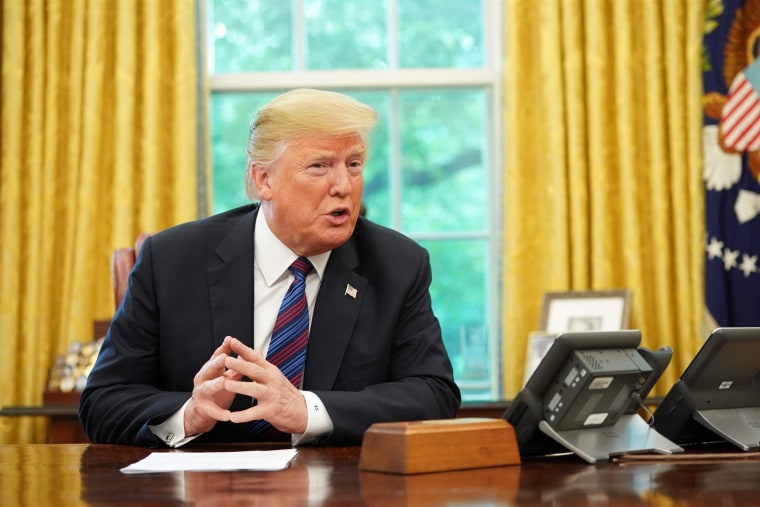Treasury Secretary Steven Mnuchin spoke at a media briefing this week and argued that he, Secretary of State Mike Pompeo, and Donald Trump are "completely aligned on our 'maximum pressure' campaign" against Iran. Mnuchin added that the policy is "absolutely working."
The policy is absolutely not working. After the president walked away from the international nuclear agreement with Iran, the foreign adversary has become more dangerous, not less, As the Associated Press reported this week, "The United Nations' atomic watchdog confirmed Monday that Iran is preparing to use more advanced centrifuges, another breach of limits set in the country's slowly unraveling nuclear deal with major powers."
There's no great mystery behind the broader dynamic: Trump took a policy that was working as intended and abandoned it for reasons he struggled to explain. Iran responded, as expected, by accelerating the nuclear program that the JCPOA policy had kept in check. As Colin Kahl, an Obama administration veteran, recently explained, "Trump's 'maximum pressure' campaign was supposed to induce Iran to scrap its nuclear program (which was already contained by the 2015 nuclear deal). Instead, Trump's actions have incentivized Iran to restart it, creating a completely unnecessary crisis."
Trump's plan -- to the extent that his whims can be credibly characterized as a "plan" -- has been to use sanctions to force Iran to the negotiating table in order to reach a deal to limit its nuclear program. Once that happens, Trump believes, he can offer Iranian officials economic incentives to entice them into an agreement.
Or put another way, the Republican hopes to do what Barack Obama already did several years ago, striking a deal that Trump rejected.
Yesterday, as the New York Times reported, Trump sent an entirely different kind of signal.
President Trump appeared to take a step back from his administration's "maximum pressure" campaign against Iran on Wednesday, leaving open the possibility of easing economic sanctions before starting new nuclear negotiations with Tehran.Although he also warned Iran against restarting production of the material necessary to make a nuclear bomb -- as the clerical government in Tehran has threatened -- Mr. Trump made clear he was ready for diplomatic talks.
After the American president referenced sanctions on Iran, a reporter asked whether he'd consider easing the sanctions as part of a diplomatic olive branch. Trump didn't rule it out, saying, "We'll see what happens."
Meanwhile, France has explored a $15 billion package that would effectively buy Iran's compliance with the international nuclear agreement -- dramatically undermining the White House's "maximum pressure" gambit -- and according to a Daily Beast report published yesterday, Trump "has left the impression with foreign officials, members of his administration, and others involved in Iranian negotiations that he is actively considering" the French plan.
Bloomberg News added that Trump has also already discussed easing sanctions on Iran -- a move then-National Security Advisor John Bolton argued against shortly before he parted ways with the White House.
It may seem fairly routine for the Trump administration's foreign policies to seem incoherent, but this is a dramatic example of the broader problem. As Sen. Chris Murphy (D-Conn.) noted via Twitter, "So Trump is going to give Iran $15 billion to come back into compliance with the agreement he tore up because it was the worst deal he had ever seen? My head hurts."
Senator, you're not alone.
The United States' position started with sanctions, which forced Iran to the negotiating table. That led to a deal: Iran received economic relief; the United States and our partners received on-the-ground inspections and a curtailed nuclear threat.
Trump trashed that deal.
The Republican then adopted a "maximum pressure" campaign, featuring sanctions, which he thought would force Iran to the negotiating table, where Trump would offer economic relief in exchange for on-the-ground inspections and a curtailed nuclear threat.
The current U.S. president is now, however, prepared to undermine his own failing policy, eyeing financial support to Iran, which he hopes will entice Iran to the table, where Trump can offer more economic relief, which is the same thing he opposed when Obama struck the deal that was working before Trump tried to kill it.
Josh Barro added, "I don't understand the point of withdrawing from the Iran deal and sanctioning Iran but then giving Iran financial aid to offset the effects of the sanctions in order to induce them to stay in the deal."
Well, sure, when one puts it that way, it seems as if Trump's entire policy is an incoherent joke.
